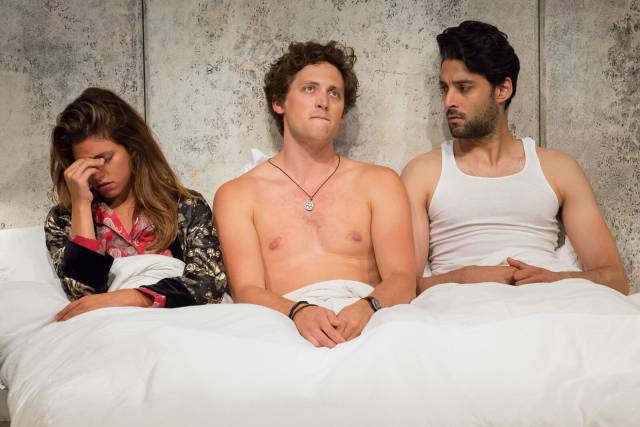

In Yussef El Guindi’s Threesome, a sexual escapade becomes the window into a world of double standards, faux convictions and misogyny as three people must come to terms with the fact that they’re not as liberal, or liberated, as they thought. When the play opens we find ourselves in the bedroom of Leila (Alia Attallah) and Rashid (Karan Oberoi), an “artsy” couple who have decided to invite a stranger into their bed for the first time. That the stranger happens to be a man makes Rashid incredibly uncomfortable, that he happens to be a white man makes both of them feel like they’re engaging in a diplomatic enterprise, rather than a hedonistic venture.
When we meet the man in question, who first appears completely naked as if to show that his intentions are all out in the open, he looks as unthreatening as a kitten; all lanky awkwardness and dorky deliveries, Doug (Quinn Franzen) seems to be completely “miscast” in Leila and Rashid’s sexual charade. As they welcome him with speeches about the lack of respect for women in male-dominated societies, the obvious privilege of Western culture, and their intolerance towards Middle Eastern values, all Doug wants to do is order a pizza and get down and dirty. With a confused look on his face he exclaims that he didn’t know he had been invited to attend a seminar.
The first act of the show then unfolds like a scene from a lighter version of Who’s Afraid of Virginia Woolf with Leila and Rashid using Doug as a pawn in their miserabilist games. Why these two are together never seems to make sense, and if the playwright is suggesting that they are a couple only because they share similar cultural backgrounds, perhaps the play would’ve benefitted from delving into that, instead of trying to make eloquent points about every single topic it touches. Unsurprisingly the play’s major issue is precisely that of Leila and Rashid’s relationship, instead of opening up so much, they should’ve dealt with the more immediate issues.
It is obvious that El Guindi’s play was never meant to be a mere sex comedy, as its ideas are too complex to be reduced to picaresque dialogues, but in a way at one point the audience can also feel as “tricked” as Doug, since the playwright might have lured more than one to attend the play with the promise of something more “fun”. The actors are all quite good, despite their having to deliver grandiose lines too often, and even if Leila’s forced accent feels like a prop, rather than a trait of the character, Ms. Attallah delivers the show’s biggest emotional punch in the gut (something you can see coming from the very first act, but that she pulls off at the end regardless). Best in show is Mr. Franzen who the play mistreats quite often, but who delivers a performance that’s all the more powerful because of how he is able to combine sincerity with blissful ignorance that translates into something resembling what others can perceive as evil.